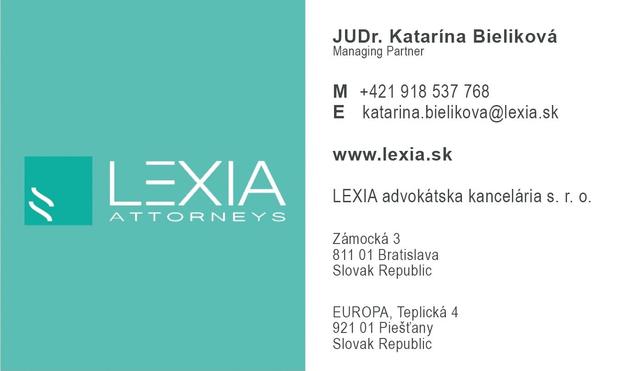Operation of corporations under the current market conditions is significantly affected by electronisation, digitalisation and automation of internal processes as well as processes related to the external environment; all of which modern corporate law must reflect.
In order to increase the attractiveness of the business environment, economic competitiveness of Slovakia and to reflect the needs of economic practice, as well as modernisation trends in advanced European jurisdictions and the harmonisation of legislation at the European Union level, the Ministry of Justice recently presented legislative intent to recodify the Slovak corporate law (complete material is available at: https://www.slov-lex.sk/legislativne-procesy/SK/LP/2020/627).
Recodification of private law presumes the new Civil Code to constitute a general norm of private law and remove the current legal dualism of regulation of contractual law, which foresees a fundamental interference with the Commercial Code in its current form. The result of the intended changes is to create a comprehensive and uniform Civil Code as the primary private law code, in addition to which a new law on corporations ought to be adopted, similar to the one currently in force in the Czech Republic. The new Corporations Act should regulate in more detail only issues related to the special nature of corporations as a specific type of legal entity, with an emphasis on capital corporations (a limited liability company and a joint stock company). The aim of the proposed changes is to increase the flexibility of capital corporations and to simplify their foundation by using various forms established by the state, thus reducing administrative barriers to starting a business.
 Katarína Bieliková, Managing Partner at LEXIA Attorneys
Katarína Bieliková, Managing Partner at LEXIA Attorneys
Considering the current situation on the corporate market, Slovakia is characterised by a relatively narrow and closed structure of corporations' shareholders, which means high interdependence between shareholders and the management of the company and the associated risk of prioritising the interest of the shareholders at the expense of the corporation's creditors. In terms of company forms, the market is dominated by limited liability companies, which account for more than 95% of all existing companies, with concern structures being relatively common. Among joint-stock companies, which account for less than 3% of all companies, so-called private joint stock companies not publicly traded are the most common.
The economic aspects of operation of corporations in Slovakia are mainly based on financing by external resources and absence of significant equity, while growing trend can be seen in private equity investment (venture capital in the form of equity) in start-ups and project companies (start-ups and scale -up), as well as raising external resources outside the traditional banking sector (e.g., through issuance of corporate bonds and other securities).
The legislative intent proposes maintenance of the four basic legal corporate forms:
a public company,
a limited partnership
a limited liability company, and
a joint stock company.
A fundamental change compared to the current regulation is the proposed abolition of the legal form of a simple share company (jednoduchá spoločnosť na akcie, abbr. j.a.s.), which has been created as a hybrid between a limited liability company and a joint stock company. Its purpose was to streamline and facilitate the entry of risk capital, especially into joint venture structures and start-ups. However, due to the relatively complex changes in the standard legal forms of companies and their modernisation it would become redundant. Existing simple share companies will be able to transform into limited liability companies and those that do not exercise this option will be governed by the law of joint stock companies.
Substantial changes are proposed for capital companies - a limited liability company (s.r.o.) and a joint stock company (a.s.).

To make a limited partnership more attractive, the legislative intent proposes that, depending on the purpose of its establishment, the founders decide whether the limited participation of limited partners will be incorporated into security. At the same time, in connection with changes in the legislation of a limited liability company, it should be possible for business shares not to be compulsorily concentrated in a single business share.
Following shall be regulated for all capital corporations:
certain rules for the exercise of a shareholder's rights, e.g., the minimum scope of the right to information and the legal instruments for its enforcement,
common rules for the decision-making of corporate bodies, e.g., passing of resolutions at a distance using electronic means of communication, invalidity of corporate bodies' resolutions and legal instruments to claim such,
uniform rules on protection of company's assets so that the shareholders draw only dividends from the company's assets and that this rule is not circumvented,
specific rules on protection of capital which, under European legislation, are imposed only on joint stock companies, will apply only to joint stock companies (or only public limited companies) and will in principle not extend to limited liability companies,
rules for transactions with related parties, in particular transactions between a corporation and its shareholders, as well as members of the company's bodies and their related parties,
revised legal regulation of a company in crisis and obligations related thereto,
special rules concerning the duties and responsibilities of members of the corporate bodies,
regulation of business decision-making (especially of the statutory body) - application of the business judgment rule,
regulation of accessory agreements of shareholders and related institutes (drag along or tag along rights or shoot-out),
regulation of the basics of concern law, content requirements and requirements for publicity of the so-called contractual concern (control agreement), as well as the conditions under which a member of the body of a controlled entity may take into account the concern's interest to the detriment of the company of which they are a member, so as not to harm the creditor or public obligations and with the obligation to compensate concern.
Limited Liability Company ( s.r.o.)
The aim of the proposed changes is to modernise the legal form of a limited liability company and thus reflect foreign regulatory trends. It shall be created as a primary capital corporation with share capital, responsible for its liabilities with all its assets and whose partners who have fulfilled their deposit obligations are not liable for the company's liabilities, and – same as at present - a single person will be able to found such and become its sole shareholder.
In terms of share capital, the legislative plan alternatively proposes to take over the Czech model and generally reduce the company's share capital to 1 Euro (Czech model), or the German model of gradual replenishment of share capital from achieved economic results with a temporary ban on profit sharing.
The proposed legislation foresees, inter alia:
the possibility of a simplified online establishment using founding documents forms resulting in lower registration fees burden,
the abandonment of the principle of unity of business share, i.e., a shareholders will be able to own several business shares with different characteristics and disposed of and encumbered separately,
possibility of exercise of shareholders' right to participate in the management of the company within the participation in the general meeting at a distance will be extended; regulation of shareholders' decision-making per rollam shall also be further specified,
possibility of incorporating a business share into the legal form of security,
creation of space to regulate the shareholder's rights associated with security, similar to what is currently the case in a simple share company (j.a.s.),
proposals for a solution of specific practical problems, particularly the property relationship to the business share (especially in relation to spousal joint co-ownership) and the disposal of a business share.
Joint Stock Company (a.s.)
The proposed new legislation of a joint-stock company reflects the fact that vast majority of joint-stock companies on the Slovak corporate market are characteristic of private joint-stock companies. The underlying motive for the recodification of public limited liability law is therefore the division between private and public joint stock companies, while a substantial part of the legal regulation of public joint stock companies as well as other means used for investment (joint stock company or investment fund with variable share capital) will be incorporated into capital market law.
The legislative proposal proposes, inter alia:
the abolition of gradual establishment of public limited liability companies. When it comes to formation with a subscription of shares, cooperation with securities dealer and the procedure under the rules of the capital market are already envisaged in the setting up process,
the abolition of the numerus clausus of share types, i.e., to the extent that this does not conflict with the substance of the rules on capital protection of a joint stock company (prohibition of interest shares). It is possible for a joint stock company to determine in its bylaws the issuance of different types of shares, which may be accompanied by different rights defined by the statutes,
the cancellation of the possibility to issue bearer shares in book-entry form,
the regulation of the distance decision-making of shareholders, including per rollam form,
the regulation of the shareholder’s right to information and tools for its application,
the enablement of a monistic structure of a joint-stock company i.e., in addition to the general meeting, a joint-stock company will only create the company's board of directors or a structure made up of a board of directors and a supervisory board.
* * *
In view of the complexity of the initiated corporate law recodification, it will be necessary to also reflect the changes within the related legal frameworks, in particular regulation on the transparency and publicity of companies, the Bankruptcy and Restructuring Act, rules on capital market law and securities, as well as the rules on tax law (in particular the tax aspects of concern relations, the tax regime for transfers of companies or transfers of participation in a company) and criminal law (e.g., criminal liability of members of bodies and associates).
We see the proposed legislative intent and the efforts to fundamentally modernise the corporate regulation resulting therefrom as bringing it closer to economic reality and European Union market standards, what undoubtedly represents a significant step towards improving the business environment in the Slovak Republic in line with the trends in neighboring European countries.
Draft of the new legislation is expected to be submitted to the Government of the Slovak Republic by the end of June 2022.

This article has been brought to you by LEXIA Attorneys



 (source: Shutterstock)
(source: Shutterstock)